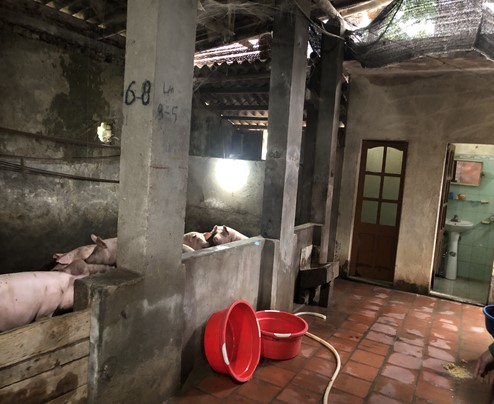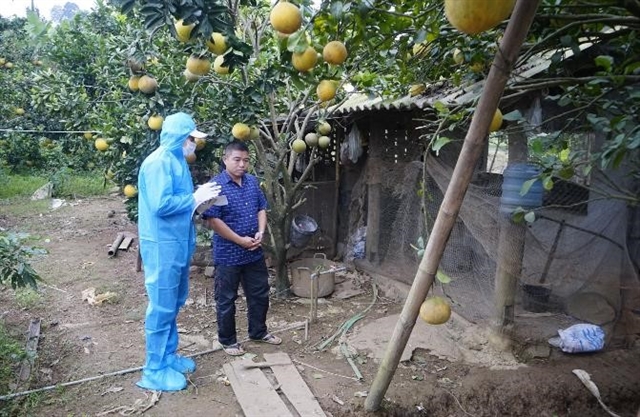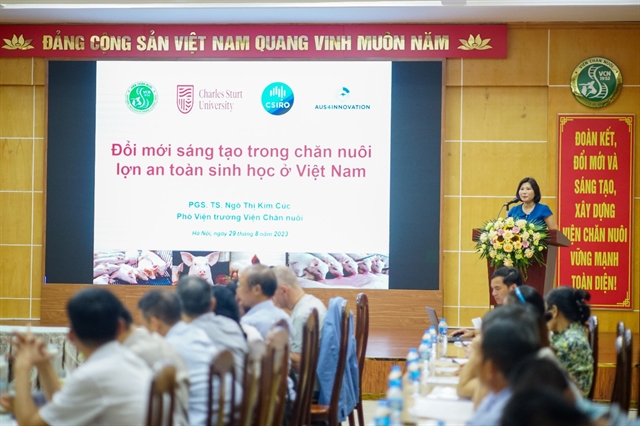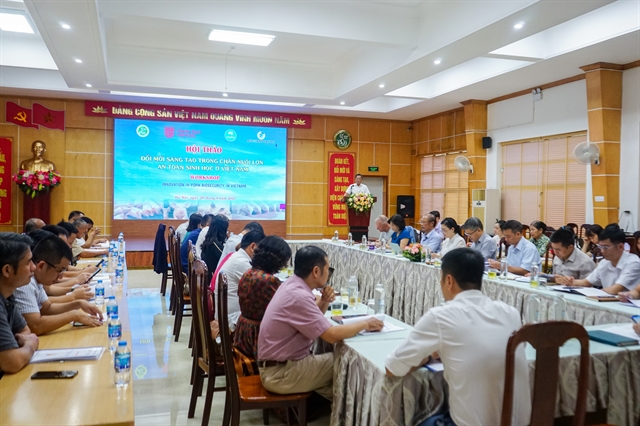 Society
Society

 |
| Most pig farming households in Việt Nam are small scale with less than 100 pigs. Photo courtesy of NIAS |
HÀ NỘI - The rapid spread of African Swine Fever (ASF) has severely affected pork supply, prices, and the livelihoods of farmers across Việt Nam since it was first detected in the country in February 2019.
Recognising the vital role of pork biosecurity, Việt Nam has implemented several proactive measures to facilitate innovations within the industry.
According to a report from the National Agricultural Promotion Centre, 99.83 per cent of the pig farming industry in Việt Nam consists of small-scale farms with less than 100 pigs.
Overall, these small-scale farms do not meet the requirements for biological safety, despite comprehensive regulations and efforts to enhance awareness through traditional education activities.
As a result, there is a significant risk to biological safety, which hampers the development of the pig farming industry in the country.
The first cases of ASF were announced in the northern provinces of Hưng Yên and Thái Bình by the Department of Animal Health under the Ministry of Agriculture and Rural Development on February 19, 2019.
By December 11, 2019, the disease had spread to 8,553 communes in 667 districts across all 63 provinces and cities, resulting in the culling of nearly 5.95 million pigs with a total weight of over 340,000 tonnes, accounting for approximately nine per cent of the country's total pig weight.
By the end of 2019, the total number of pigs nationwide that had died or been culled due to ASF had reached six million, accounting for 20 per cent of the total pig population.
In May 2022, the National Institute of Animal Science (NIAS) organised a workshop discussing the needs and challenges regarding pork biosafety in the context of the outbreak of ASF. The workshop concluded that the greatest biological safety risks were faced by farmers with fewer than 20 breeding sows.
NIAS also conducted the international scientific project Innovation Alliance for Biosecurity in Pig Farming in Việt Nam, sponsored and coordinated by the Aus4Innovation Programme (A4I) in Australia. Within the project, NIAS staff coordinated with the Hòa Bình Animal Husbandry and Veterinary Sub-Department, the Bắc Giang Sub-Department of Animal Husbandry and Animal Health, and the Hà Nam Sub-Department of Animal Husbandry and Animal Health to survey and investigate the situation of pig raising in the three districts of Tân Lạc, Bình Lục, and Yên Thế in 2022 and early 2023.
 |
| NIAS staff carry out a survey on the situation of pig raising within the international scientific project Innovation Alliance for Biosecurity in Pig Farming in Việt Nam. — Photo courtesy of NIAS |
Preliminary results revealed that local farmers were more concerned about biosecurity in pig farming; however, there were still several issues in the implementation of biosecurity practices, such as inconsistent sanitation and disinfection of vehicles and equipment, inadequate control of people and vehicles entering and exiting the farms, use of excess feed for pigs, and inadequate management of exotic animals. In addition, pig raising households did not properly update biosafety pig raising processes, leading to the uncontrolled spread of the pig diseases, which consequently resulted in severe economic losses as well as a lack of pork supply.
On the morning of August 29, 2023, the NIAS, in collaboration with the Aus4Innovation Programme (A4I) – Australia, held a workshop on "Innovation in Pork Biosecurity in Việt Nam".
 |
| Vice General Director of the National Institute of Animal Science, Prof. Dr. Ngô Thị Kim Cúc, speaks at the workshop on "Innovation in Pork Biosecurity in Việt Nam". — Photo courtesy of NIAS |
Participating in the conference were representatives of the Australian Embassy in Vietnam, Aus4Innovation Programme (A4I), Department of Science, Technology and Environment, Department of Livestock Production, Department of Animal Health, Institute of Veterinary Medicine, FAO, ILRI, National Centre for Agricultural Extension, National Institute of Animal Science, Vietnam Academy of Agriculture, along with other relevant department, small-scale pig farmers and a number of companies in the pig industry in the north of Việt Nam.
Experts, scientists and veterinarians were able to meet, present reports, and share knowledge and experience on biosafety measures in pig farming.
They also recommended the establishment of the Innovation Alliance in biosafety pig production in Việt Nam, which will create a platform for innovations in addressing the challenges of the pig farming industry, promoting biosafety in animal husbandry, and enhancing the industry's capacity against diseases, natural disasters, and climate change. VNS
 |
| The workshop on "Innovation in Pork Biosecurity in Việt Nam", hosted by NIAS in collaboration with the Aus4Innovation Programme (A4I) – Australia. Photo courtesy of NIAS |